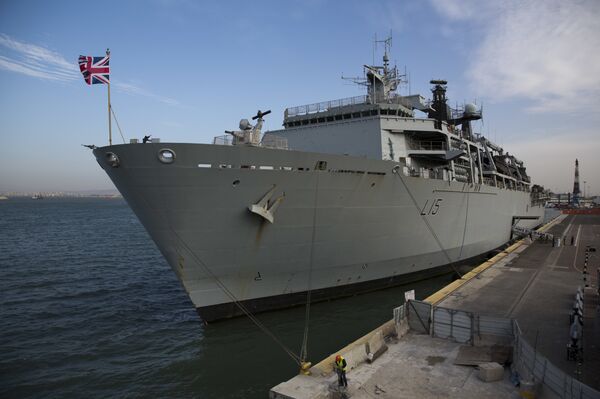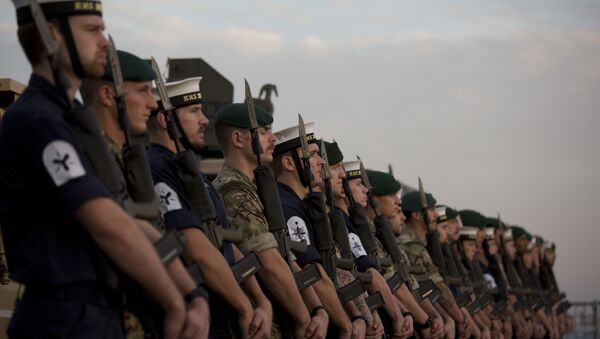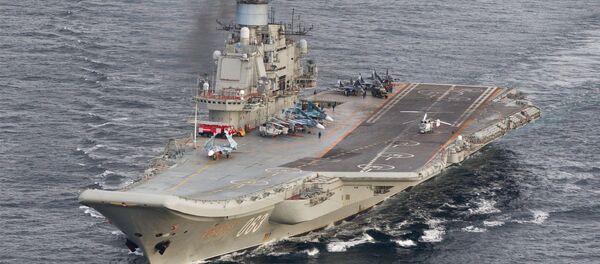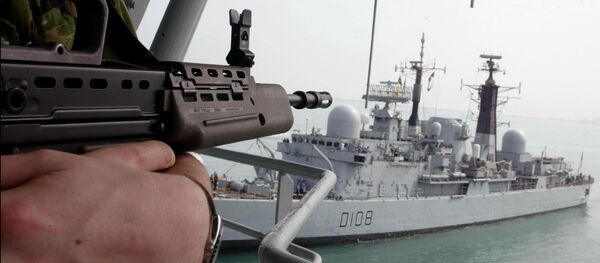Military chiefs have warned that the UK's ability to carry out major amphibious operations in the future could be seriously threatened if a proposal to sell front-line warships to Chile and Brazil is implemented.
The two South American countries have been told two Royal Navy assault and amphibious landing platform ships — HMS Albion and HMS Bulwark — could become available for sale next year along with two Type-23 frigates in order to solve a major funding crisis, according to specialist defense journal Jane's.

The Type-23 frigates, armed with Harpoon anti-ship missiles and with a crew of 185, are used to track Russian submarines and already play a key role in protecting the Royal Navy's two new aircraft carriers, HMS Queen Elizabeth and HMS Prince of Wales.
The new generation of frigates to replace the Duke-class vessels will not be available until 2020.
The possible sell-off comes after it was revealed HMS Atherstone and HMS Quorn, two of the Royal Navy's 15-strong fleet of mine-hunting vessels were scrapped in September instead of undergoing a series of planned upgrades.
HMS Quorn & HMS Atherstone refitting simultaneously in the Minor War Vessels Centre of Specialisation in Portsmouthhttps://t.co/ZW5pLWR77g pic.twitter.com/4wyGTBAZS2
— NavyLookout (@NavyLookout) December 10, 2016
It has also been suggested that naval officials have already advised the navies of Brazil and Chile of an impending sale of other vessels, possibly as soon as 2018, with three more frigates becoming available in 2023, in order to bridge a gap in military spending reputed to be between £20 billion (US$26.4 billion) and £30 billion (US$39.6 billion) over the coming decade.
Senior Naval Figures Voice Concerns
Naval sources have confirmed that the impending retirement of the two amphibious assault vessels remains a key issue in a range of proposals drawn up by the First Sea Lord, Admiral Sir Philip Jones. Senior officers have also hinted that cutting two frigates is another possible way of meeting defense spending targets.
Senior naval figures along with MPs have voiced their dismay over any sell-out of HMS Albion and HMS Bulwark, which most recently was involved in rescuing migrants in the Mediterranean, as their loss would leave Britain unable to carry out major amphibious operations.
Refuelled, resupplied, refreshed & secured for sea. @hms_albion under ‘sailing orders’ to return to sea. #FridayFeeling @RoyalNavy pic.twitter.com/bEiSetAYpW
— HMSAlbion (@hms_albion) October 13, 2017
Military chiefs met in London on Wednesday, October 25, to discuss ways of saving nearly a billion pounds (US$1.3 billion) during the current financial year, as well as substantial further cost-cutting measures over the next 10 years.
Launched during the last decade, both HMS Albion and HMS Bulwark were thought to have nearly 30 years service still left in them.
"These ships are almost new. It's like having 12,000 miles on the clock," said one naval source.
Major General Julian Thompson, a retired Royal Marines officer, who commanded 3 Commando Brigade during the Falklands War, insisted the ships were "absolutely vital."
"Without them, the navy would struggle to land heavy equipment and armor on beaches," he said.
He argued that the ships' ability to load light armored vehicles and engineering equipment onto landing craft could not be replaced by helicopters or other support ships.
"If you give this capability away, you can't get it back in a hurry," he warned, adding there was "no substitute."
Using other vessels, such as Royal Fleet Auxiliary support ships, which provided aid recently in the Caribbean after the hurricanes, was not worthy of consideration as a back-up plan.
MoD Hits Back: 'Pure Speculation'
The British Ministry of Defence (MoD) has strongly denied it plans to cut navy resources that are already overstretched, insisting there has been "no engagement" with any foreign countries over a possible sale.
"We can categorically confirm that there has been no engagement with either Chile or Brazil in respect of Type-23 frigates or the two landing platform dock ships. In the face of intensifying threats, we are contributing to the cross-government review of national security capabilities and looking at how we best spend our rising defense budget to protect our country. No decision have been made and at this stage, any discussion of the options is pure speculation," an Mod spokesperson said.
Sir Michael Fallon, Britain's defense secretary, faced repeated questioning from MPs on the sale when he appeared before the Commons Defense Committee on Wednesday, October 25.
He dismissed the reports as "pure speculation," and said he had yet to receive any proposals from service chiefs on how they planned to save money.
"We have to consider the way in which the threats have intensified. We have to spend money on dealing with threats from cyber, as well as finding resources to storm beaches. The threats have intensified in other domains apart from storming beaches," Sir Michael said.
His comments were challenged by Julian Lewis MP, the chairman of the committee.
"I am sorry secretary of state, there is no way that a Queen Elizabeth Class carrier can substitute the capabilities of Albion or Bulwark as a landing platform," Mr. Lewis said.
Johnny Mercer MP, a former officer in the Royal Marines, said cutting the two ships would significantly limit Britain's military options in the future.
He pointed out that "no other ships could act as floating, amphibious command centers in the same way.
Compromising UK Defense
Lt. General Mark Poffley, deputy chief of defense staff for military capability, told MPs: "Quite clearly Albion and Bulwark provide some very specific capability."
He said that if the ships were to be axed, their attributes would either have to be replaced or "one would have to accept that you are taking a compromise in that part of your operational portfolio."
Defense chiefs have already complained there is not enough funding to fulfill the plans outlined in the UK government's 2015 strategic defense and security review.
Priorities have also had to be redrawn in the wake of a string of terrorist attacks in Manchester and London during 2017.
In September the Royal Navy announced a radical shake-up of how warships will be built in future with the work being spread around a number of shipyards in the UK.
The defense secretary confirmed at the same time plans to buy five Type 31e general purpose frigates — a cut-price warship — to bolster the navy's depleted fleet. The first one costing £250 million (US$330 million) is expected to enter service in 2023.






